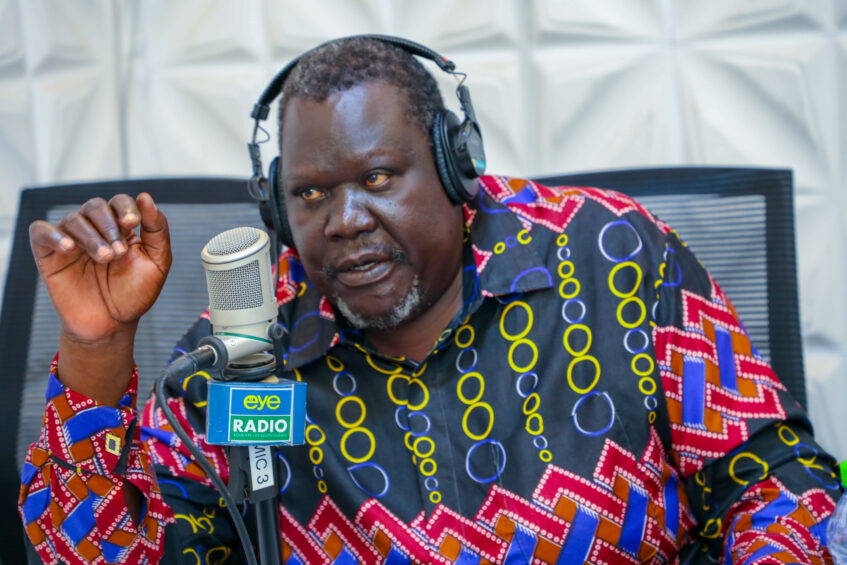You are here: Home | Governance | News | Land Commission boss seeks public views on proposed land legislations

Robert Bima Loki, the Chairperson of South Sudan Land Commission. (Awan Moses).
The head of South Sudan Land Commission is encouraging members of the public, especially youth, to add their views to the draft National Land Policy intended to enable the country to have good laws for land governance.
The national land policy proposes the enactment of new legislations effecting its provisions on strengthening the land administration system in the country.
The proposed laws are Community Land Act, Public Land Act, Land Registration Act, and Land Commission Act.
The body also proposes the Physical Planning Act to incorporate town and country planning, Land Survey Act, Climate Change Act, and a family law incorporating the inheritance of land.
South Sudan Land Commission Chairperson Robert Bima Loki said he expects members of the public to add their views before the document advances is forwarded to the National Parliament for further deliberations.
According to him, the draft national land policy is open for public discussion and those interested are invited to channel their views through their lawmakers.
“We will open up consultation. There will be open debate in the radio, and even if the youth want to sit alone, take a draft and discuss and say we the youth we feel that these issues are not addressed, it is open for debate, you know,” said Mr. Loki to Eye Radio on the sidelines of a two-day high-level consultation workshop on National Land Policy in Juba on Wednesday.
“If you have a person who represents your area and you feel you people have a problem, tell your MP to raise it in the parliament so that it is included.”
“If you want to access it [land policy], we have a task force in the Ministry. If you want more copies, organize yourself whether you are a civil society group or you belong to a radio.”
The 56-page Draft National Land Policy, April 2023 document has five chapters covering the background of the policy highlighting land governance issues and challenges in South Sudan.
It also contains a framework of the national land policy, policy options, and strategies as well as the implementation mechanisms.
The proposed land policy states that all lands in the country are owned by the people of South Sudan and that its usage shall be regulated by the government.
Once adopted, the existing laws on tenure, property rights, and land administration shall be reviewed and amended.
Such laws include the Land Act 2009, the Local Government Act 2009, the Investment Promotion Act 2009, the Petroleum Act 2012, and the Mining Act 2012.
It also recommends for adoption of new policies on climate change, disaster risk reduction, and management of Internally Displaced Persons and returnees.
Land boss Loki said the government will develop more other laws to address some of the issues facing land governance in the country.
“The policy gives you general guidelines of what you want to do like for investment for development, for the issues of the movement of livestock but now you have to come up with detailed laws because now people say the policy is not comprehensive.”
“The policy need not be comprehensive it just introduces you to topics; for instant, the land is owned by the people. What do you mean by the people, are the people the various communities, and it could be private individuals, but now, the details of the law will have to specify that.”
However, during the research and consultations conducted by the Ministry of Land, Housing, and Urban Development insecurity is said to be the major cause of land governance issues.
Other challenges identified include a lack of consensus on who owns the land, weak land administration and management, and displacement resulting from conflicts and disasters.
Other are land grabbing and illegal land occupation, disputes over internal boundaries and international borders, climate change and disasters as well as informal settlement in cities and towns.
Dorothy Drabuga, the Chairperson of South Sudan Land Alliance said the lack of implementation of existing laws has given room for poor land governance in the country.
She is therefore encouraging the South Sudan authorities to ensure land policy is implemented.
“If this policy is passed, I think all these issues of land grabbing will stop but what happens after it is passed, implementation is very important because we may be here saying the land policy, ABC but if it is passed and then implementation is not there, then we would have done nothing.”
“In the absence of a national land policy, we still have laws that exist but due to lack of implementation, people still suffer discrimination and people’s land is being grabbed and all these issues. So, for me, it will be important, or it is high time the government starts implementing the laws that we have in place so that all these issues of land grabbing will stop.”
The new document embraces the wealth-sharing protocol of the Comprehensive Peace Agreement, 2005, the constitution of South Sudan 2011, the African Union framework, and guidelines on land policy initiative.
Others include consultations with the ten states, revitalized peace agreements as well as regional and international experience.
South Sudan with a population of around 13 million people, has an approximate geographical size of 658,842 square kilometers with its territory as defined by the 1956 British colonial boundaries.
Support Eye Radio, the first independent radio broadcaster of news, information & entertainment in South Sudan.
Make a monthly or a one off contribution.
Copyright 2024. All rights reserved. Eye Radio is a product of Eye Media Limited.